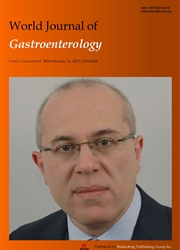

 中文摘要:
中文摘要:
瞄准:在 CHFR 的表示上在人的胃的癌症(GC ) 和它的影响调查 CHFR 倡导者的异常甲基化 mRNA 和蛋白质,以及它与人的 GC 的临床、组织学的特征的关联。方法:Methylation 特定的聚合酶链反应(MSPCR ) 被用来在 20 件主要 GC 样品检测 CHFR 倡导者的甲基化地位并且配对正常胃粘膜。CHFR mRNA 和蛋白质表情被 RT-PCR 并且由西方的弄污调查。在 39 件 GC 样品的 CHFR 蛋白质表示是组织化学地检验的免疫。结果:基因在 20 件 GC 样品(45%) 和 CHFR mRNA 和蛋白质的下面规定中的 9 个被发现的 CHFR 的 DNA 甲基化显著地与 CHFR 基因的甲基化地位被联系(P = 0.006 ) 。在相应非肿瘤的粘膜的 20 件样品, CHFR 基因的 DNA 甲基化都没被检测。在糟糕区分的 GC 样品的 CHFR 基因甲基化在区分得好的 GC 样品比那显著地高(P = 0.014 ) 。而且,在嵌入石蜡的 GC 样品的否定 CHFR 蛋白质表示率是 55.07%(38/69 ) ,在糟糕区分的 GC 样品的积极的率是 36.73%(18/49 ) ,它比(13/20 )65.00% 在区分得好的 GC 取样显著地低(c2 = 4.586, P = 0.032 ) 。结论:CHFR 基因的异常甲基化可以涉及 GC 的致癌作用和开发,并且是下面规定的占优势的原因或 CHFR mRNA 或蛋白质表示的损失。当 CHFR 倡导者的异常甲基化与肿瘤区别被相关,它可以帮助预言 GC 和 CHFR 的预后以后可以为 GC 成为基因治疗的一个新奇目标。
 英文摘要:
英文摘要:
AIM: TO investigate the aberrant methylation of CHFR promoter in human gastric cancer (GC) and its impact on the expression of CHFR mRNA and protein, as well as its correlation with clinical and histological features of human GC. METHODS: Methylation-specific polymerase chain reaction (MSPCR) was used to detect the methylation status of CHFR promoter in 20 primary GC samples and paired normal gastric mucosa. The CHFR mRNA and protein expressions were investigated both by RT-PCR and by Western blotting. The CHFR protein expression in 39 GC samples was immunohistochemically examined. RESULTS: The DNA methylation of the CHFR gene was found in 9 of the 20 GC samples (45%) and the down-regulation of CHFR mRNA and protein was significantly associated with the methylation status of the CHFR gene (P = 0.006). In 20 samples of corresponding non-neoplastic mucosa, no DNA methylation of the CHFR gene was detected. The CHFR gene methylation in poorly differentiated GC samples was significantly higher than that in well-differentiated GC samples (P = 0.014). Moreover, the negative CHFR protein expression rate in paraffin-embedded GC samples was 55.07% (38/69), the positive rate in poorly differentiated GC samples was 36.73% (18/49), which was significantly lower than 65.00% (13/20) in well-differentiated GC samples (X^2 = 4.586, P = 0.032). CONCLUSION: Aberrant methylation of the CHFR gene may be involved in the carcinogenesis and development of GC, and is the predominant cause of down-regulation or loss of CHFR mRNA or protein expression. As aberrant methylation of CHFR promoter is correlated with tumor differentiation, it may help to predict the prognosis of GC and CHFR may become a novel target of gene therapy for GC in the future.
 同期刊论文项目
同期刊论文项目
 同项目期刊论文
同项目期刊论文
 期刊信息
期刊信息
